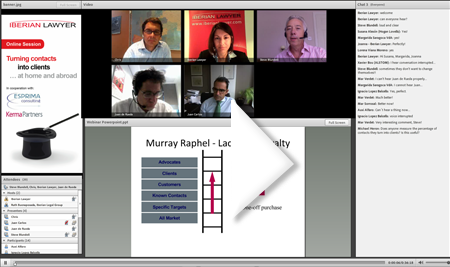Lawyers need to adapt to current times by listening closely to client needs and focusing on sector knowledge
In these current tough economic times and in an already saturated market, lawyers are continually looking to source more business for themselves in order to maintain and increase income levels.
This requires business development and communication activities, in their many forms, to identify and make connection with target clients. Once that is achieved, the challenge remains – how to turn those contacts into clients? A recent online session hosted by Iberian Lawyer ( see more information here) focused about taking warm leads and converting them into fee-paying clients. Beyond that, the session also considered the extent to which this challenge is different when working with target clients from different countries, languages and cultures.
From contact to client
One of the initial challenges is to generate new business, and at the session Steve Blundell, consultant at KermaPartners refered to Murray’s Ladder. This describes the process of addressing the market in general through all the stages leading to an ‘advocate’ relationship with a client – one who is willing to recommend you and your firm to others. Whilst price is clearly an increasing factor in selecting an advisor, the core considerations remain the expertise of the lawyer and the excellence of the service provided.
Clients still tend to select their lawyers based on their previous experience and personal recommendations, Indeed, it was agreed that the most effective form of marketing is the creation of ‘advocates’, where your clients become active promoters of your firm.
Throughout the process of climbing this client ladder, it is also important to build a personal connection with the people you are dealing with – not just a business one. “People buy from people they like and trust” said Chris Scoble, consultant at ESPRIMA. Without crossing over into indiscretion, we should always try to find out something about the client outside the strictly business environment – hobbies, interests etc. This helps to break down barriers, and can provide those ‘hooks’ that help to cement the relationship on different levels.
Bridging the differences
In discussing the challenges of operating in a cross-border business environment, behaviour was identified as a major factor, i.e. how to operate outside the norms of your own culture. In your own market, any cultural considerations in conducting business are second nature. However, when working in a different environment, there is necessarily an uncertainty about how to act.
On international issues, business and market knowledge is crucial for companies to expand or develop business. In-House lawyers present at the session insisted not to underestimate the client market knowledge and never to lie about the capacity and know-how that a law firm can bring. Honesty and transparency is very much valued by clients.
The conclusion of the session highlighted the importance of developing a one-to-one relationship and value the attention required depending on the concern placed by the client, as well as to understand better and to respond to the different expectations with an open mind.
|
Subscribers only: See the whole recorded session by logging in first and then click here. |












